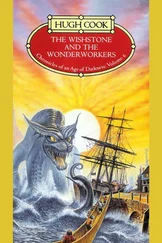Hugh Cook - The Wordsmiths and the Warguild
Здесь есть возможность читать онлайн «Hugh Cook - The Wordsmiths and the Warguild» весь текст электронной книги совершенно бесплатно (целиком полную версию без сокращений). В некоторых случаях можно слушать аудио, скачать через торрент в формате fb2 и присутствует краткое содержание. Жанр: Фэнтези, на английском языке. Описание произведения, (предисловие) а так же отзывы посетителей доступны на портале библиотеки ЛибКат.
- Название:The Wordsmiths and the Warguild
- Автор:
- Жанр:
- Год:неизвестен
- ISBN:нет данных
- Рейтинг книги:4 / 5. Голосов: 1
-
Избранное:Добавить в избранное
- Отзывы:
-
Ваша оценка:
- 80
- 1
- 2
- 3
- 4
- 5
The Wordsmiths and the Warguild: краткое содержание, описание и аннотация
Предлагаем к чтению аннотацию, описание, краткое содержание или предисловие (зависит от того, что написал сам автор книги «The Wordsmiths and the Warguild»). Если вы не нашли необходимую информацию о книге — напишите в комментариях, мы постараемся отыскать её.
The Wordsmiths and the Warguild — читать онлайн бесплатно полную книгу (весь текст) целиком
Ниже представлен текст книги, разбитый по страницам. Система сохранения места последней прочитанной страницы, позволяет с удобством читать онлайн бесплатно книгу «The Wordsmiths and the Warguild», без необходимости каждый раз заново искать на чём Вы остановились. Поставьте закладку, и сможете в любой момент перейти на страницу, на которой закончили чтение.
Интервал:
Закладка:
Then she was feeding him again, then hurting his hand; he tried to protest, but she fed him with even, placid spoonfulls which slurred and slubbered on his tongue. Her hands were diligent, the blankets very warm. Yet so uncomfortable.
His troubling fingers plucked bits of moss and lichen from the blankets. Dry. Tasteless. He spat them out. It occurred to him that perhaps he was not in a bed at all, but swallowed by some hole in the forest, chewing on moss and dreaming strange dreams while he eased his way toward death.
The rocks above looked solid, sullen, certain.
A cave, then.
The shiftless wind came shifting in through a cold square hole in the cave. Beyond lay a high harsh light which might have been daylight. Things clawed at the hole, scratching, scraping, grasping, gasping. They wanted him.
Frightened, he called for help.
She came to him. Her voice was half birds and half water. Or was it rainbow? Her eyes, dark. Her hands, slender. She fed him soup; he tried to hold the spoon, but found himself clumsy as a baby. She did not laugh.
The next time she came, she was shorter, heavier, and just a little bit sour. Her eyes had changed from dark to grey, her hair from black to fair. The blankets were still scratching him. He complained about them. This time, she said nothing.
Attempting diligence, he tried to remember her face, but it shifted with uncanny agility. As in a nightmare, he tried to stabilise his memories, only to have them prove incompetent each time she entered. Finally he thought:
– Different women tend me.
And knew his thought for truth.
He was healing.
He began to take stock of his situation.
The room was small. Square. Dark. One door. The door led through shadows to a coffin-lid dungeon of darkness. One window. From the bed, he could see the bare branches of a tree, grasping and clutching at the thriftless wind.
What was the room made of? Stone. Vast slovenly blocks of stone. No mortar. Above him, a single grey tombstone stretched from wall to wall. He thought of himself as a tiny huddle of flesh and sensation hunched up inside a dull, grey, senseless prison of dour mass, monotonous weight, inertia and habitual oppression.
"I'm hungry," he said.
She entered, matching none of his memories. By the windowlight, he saw she was dressed in bulky, padded clothes of woven bark. Tufts of moss and lichen peeked out between the warp and weft; perhaps, beneath that padding, she was as slender as a tree in sunlight. Or perhaps not. It occurred to him that, in any case, not all trees were slender. Not even in sunlight.
She did not frown or smile; though courteous, she was grave, restrained in her dealings with him.
She brought food.
He ate gruel, pap and watered bread.
It was all he could manage.
The bread was very strange. It was heavy and loamy, tasting sometimes of honey and sometimes of fish. Was it made from grain? Or from some kind of pasted root? Eating, he scented swamp. The bread was not to blame. The wind coming in through the window was bringing him the smells of marsh, bog and slough.
When she came again, he ate the soup without help; he could sit up by himself. His blankets were the same woven bark as her clothes, padded with the same mosses and lichens. He resented their million million insect-creeping legs, claws and feelers.
"Wool makes better blankets," he said.
She answered him with words which were half music, half ripening fruit. Which was strange, for it was the wrong season for ripening fruit. Unless he was mistaken, it was winter. So thinking, he spun down in a dizzy spiral, fainting.
When he woke, it was night.
The shutters had not been fastened properly; they creaked, groaned and laboured in the knock-kneed wind.
"Shutters," he said, complaining.
And nothing answered no-one.
His head was light yet his limbs were death-heavy. His knee-joints were made of curdling milk. Hands alien. His throat was dry; he was thirsty. Perspiring, he reached the shutters; he could not remember getting out of bed. He found a cord which secured the shutters, tying one to the other. He pulled it free. The shutters swung apart.
He saw bright moonlight, broken buildings, and the titubant shadows of trees reeling in the violent, gusting wind. Banners of turbulent cloud streamed across the moon; when the clouds cleared, the moonlight showed him the dull, low-slung outline of a heavyweight wall which caught the moonlight in its open crescent. Set in the middle of that crescent, like a stump about to be reaped by a sickle, was a vast stone beehive, many times the height of a man. It had no windows, and only one door. Sullen fire glowed within.
– Where am I?
Leaves, thin, scampering prey, fled before the wind. Others followed close behind, cruel scuttling predators which kept close to the ground as they moved on the kill. Then all the leaves were suddenly flung upward in turbulent spirals as the buffeting wind switched and turned.
The change in the wind brought Togura a whiff of something foul. It was not swamp or mud or wet water. It was the rot and decay of the flesh. It was a putrid, evil smell of degenerating nightmares, of soft fat becoming fungus, of bones riddled with worms, of eyeballs subsiding into dark pools of purulent liquid.
Togura was almost certain that the smell was coming from the beehive.
The wind changed. And the fire which he could see within the beehive was suddenly obscured, as if someone was walking down a passageway, blocking the view to the center. Suddenly, terrified, Togura knew that he must not be caught here at the window, watching, witnessing.
He closed the shutters and secured the cords which held them against the wind. Returning to bed, he found himself unable to sleep. Yet when he opened his eyes again, it was morning. Feeding on soup and the meat of a small fresh-water turtle, he comforted himself with the thought that the wall, the beehive and the sudden stench must all have been part of a nightmare.
But when his recovering health allowed him to totter around at liberty, he found that the window's daylight view was the same as its night-time aspect. He had not been dreaming. Sometimes, indeed, the shift of the wind brougth him hints of something foul, and always he identified those hints with the beehive.
He did not know whether he was a guest, a slave or a prisoner, but when he was well enough to walk along a stone shaft as blind as darkness and make the turns which took him to the outer world, they put him to work.
It was most certainly winter by now. His old clothes had disappeared, together with his leather boots; he wore clogs, and clothes of woven bark stuffed with mosses and lichens, and a great big ear-comforting flap-hat consisting, as far as he could tell, of several birds' nests held in a net of woven bark. His skin broke out into strange red rashes, which itched. But he endured.
They put him to work at first on the simplest of tasks. A woman took him to a fire which was burning outside a building inhabited by females. He had already once tried to enter that building, and had been prevented.
She pointed at the fire.
"Koo'-l'na-ve'e'esha," she said, giving different musical values to each of her fleeting syllables, so that this, the simplest of her communications, became an intricate telestic pronouncement.
"What?" said Togura.
"Ko'laaskaa-n'esha-esa. Cha?"
"Ko?" he queried, trying to get her to repeat the phrase.
Impatiently, she slapped her elbow. He had seen these people use this gesture before. Sometimes it seemed to be employed as a form of negation, but in some people it seemed to be simply a kind of nervous tic. She showed him a cut-down hollowed-out gourd which was lined with clay. She took a stick and scraped red-hot coals into it. Showed it into his hands.
Читать дальшеИнтервал:
Закладка:
Похожие книги на «The Wordsmiths and the Warguild»
Представляем Вашему вниманию похожие книги на «The Wordsmiths and the Warguild» списком для выбора. Мы отобрали схожую по названию и смыслу литературу в надежде предоставить читателям больше вариантов отыскать новые, интересные, ещё непрочитанные произведения.
Обсуждение, отзывы о книге «The Wordsmiths and the Warguild» и просто собственные мнения читателей. Оставьте ваши комментарии, напишите, что Вы думаете о произведении, его смысле или главных героях. Укажите что конкретно понравилось, а что нет, и почему Вы так считаете.












